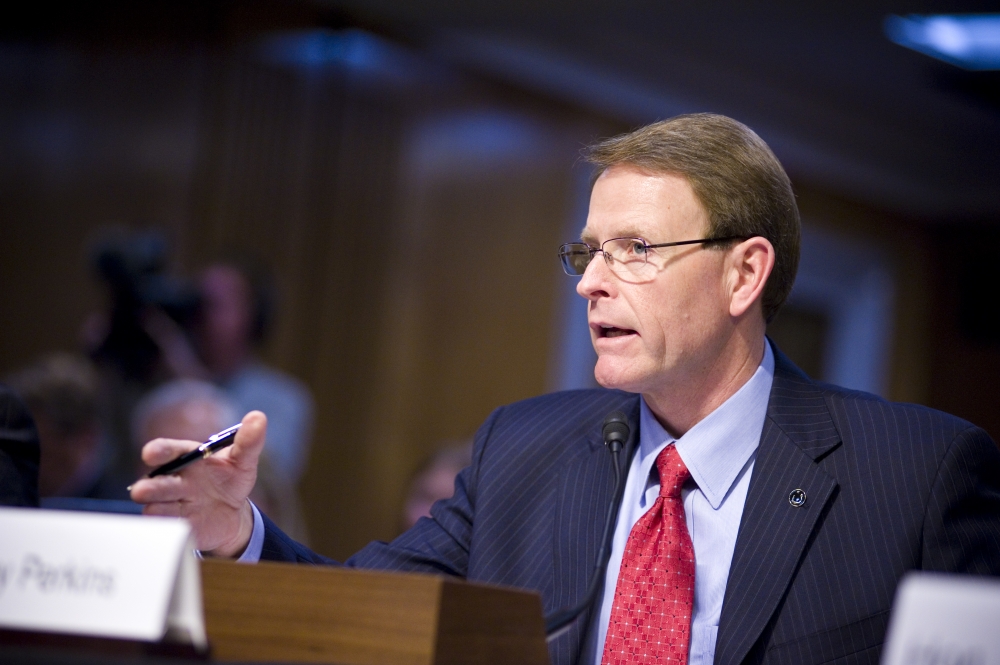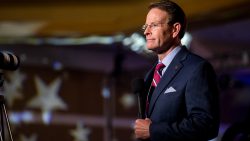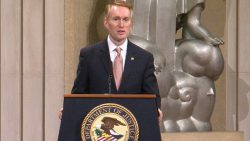As U.S. Secretary of State Mike Pompeo gathered diplomats from a number of countries at State Department headquarters last week to address threats to religious liberty around the world–including deadly persecution religious minorities face in many countries—several U.S. Religious Right groups hosted their own events in Washington, broadly based on the same theme.
The Heritage Foundation and Concerned Women for America hosted an event last Thursday that featured opening remarks by Rep. Robert Aderholt (R-AL). After reading the First Amendment’s religious liberty protections, Aderholt commented: “In today’s political climate, many have turned this statement into something that it’s not. The concept of separation of church and state has prevailed over language protecting freedom of religion.”
After recounting examples of diminished religious freedom overseas, Aderholt turned to “deeply concerning” trends in America such as business owners being required to abide by nondiscrimination laws that they say conflict with their religious beliefs. “Ironically,” said Aderholt, “the principle of tolerance is often used as a tool used to suppress freedom of religious belief, sometimes targeting conservative Christian values.”
Aderholt was followed by a panel discussion moderated by Emilie Kao, director of the Heritage Foundation’s DeVos Center for Religion and Civil Society. Kao introduced the theme of the event, which was titled, “How to Protect International Religious Freedom from the Politicization of Human Rights.”
Two trends threaten freedom of thought, conscience, and religion, Kao said. One is what she called the “inflation of human rights”—which she described as mislabeling social and economic development goals as social and economic rights. The other, she continued, was “the growing tendency to prioritize the beliefs of some identity groups over the freedom of individuals to hold and act upon their beliefs about sexuality, marriage, the family, and what it means to be male and female.”
Panelist Aaron Rhodes, author of “The Debasement of Human Rights: How Politics Sabotage the Ideal of Freedom,” chimed in on the theme of “human rights inflation.”
“The currency of human rights has lost value as more human rights have been proclaimed,” Rhodes asserted, sometimes through “ideological and irresponsible activist judicial interpretation, whereby judges create new human rights and change the meaning of existing rights.”
“The proliferation and dilution of human rights and religious freedom is a desired goal of abusive governments,” Rhodes asserted, “and one enthusiastically supported by useful idiots in liberal democracies, who see in human rights a way to promote political goals and build a global regulatory utopia.”
The problem, as Rhodes sees it, is “UN human rights dogma” that gives social and economic rights the same weight as “natural rights.” Rhodes mocked the European Union Charter of Fundamental Rights, which he said protects “the right to access a free employment service.” Asked Rhodes, “Is the right to employment counseling just as important, just as paramount, as the prohibition against slavery, or the right to freedom of religion? Or put another way, are those rights no more important than publicly funded employment counseling?”
He also criticized the European Convention of Human Rights for allowing limits on religious freedom in the interests of public safety, the protection of public order, health or morals, and for the protection of the rights and freedoms of others. “These are rather vague,” he said, adding that these limitations have allowed European countries to restrict Muslims’ religious expression.
Shea Garrison, an international development practitioner and senior adviser for foreign affairs to the Concerned Women for America, continued with the theme. “In the international arena,” Garrison said, “the concept of human rights has increasingly become so watered down that it’s hard for the practitioner and the policy maker to recognize the difference between transcendent–or what I believe are God-given rights of the individual–and the things we call rights, that are actually only the interests of certain groups of society.”
But, Garrison said, some rights that are termed social and economic rights are actually human rights, such as women’s equal access to economic opportunity, the right to own property, and freedom from economic exploitation. “So in the sense that women’s rights and gender equality seek to advance the equality of the sexes, and not to advance the interests of certain political or identity groups, women’s rights are, as Hillary Clinton once said, human rights.”
Garrison said that there’s evidence that religious freedom leads to better social and economic well-being of societies, and that religious restrictions and hostilities are directly detrimental to economic growth.
During a Q&A session, Garrison decried the “cultural imperialism” of U.S. foreign aid programs that promote “socialization programs in LGBT” that she said teach students and health practitioners a redefinition of sexual orientation and gender identity. She said these programs promote an “ideology” not supported by most Americans and take the focus way from protecting the human rights of LGBT people who are faced with violence, false imprisonment and killing.
Also speaking was First Liberty’s Benjamin Bull, a former chief counsel of the Alliance Defending Freedom and former head of ADF International. He also mocked the “inflation” of human rights to include the right to be from noise pollution, the right not to be spanked, and the right to peace. “That must be for John and Yoko,” he said.
He charged that the “activist left” is “using these newly manufactured, minted human rights to basically crush traditional human rights.” Bull cited examples from Europe, Canada, and Latin America of pastors being charged with breaking hate speech laws for preaching or speaking on behalf of traditional biblical views of sexuality and marriage. And he cited a recent ruling by the Canada Supreme Court upholding actions by regional bar associations that deny law licenses to graduates of a Christian university that required its students to sign an agreement that they would not engage in sex outside of one-woman, one-man marriage. Although the First Amendment would prevent such prosecutions in the U.S., Bull still sees Canada’s court ruling as a warning to Americans. It is true that the U.S. has a Constitution, he said, “but we also have very creative judges.”








